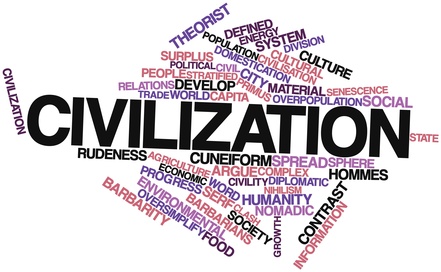 The Simulating Religion Project (SRP) is a cluster of subprojects aiming to apply modeling and simulation techniques to the scientific study of religion. Modeling and simulation depends on data, so building and finding datasets is vital. There has been little past simulation research in religion. Extant work has posited very simple human minds, simple interactions, simple behaviors, and simple modes of change. This is for good reasons: excessive complexity in a simulation obscures the relevant lines of causality and causes us to lose cognitive control over our own model. But this leaves us with a problem: too much simplicity gives wrong answers, and too much complexity gives unclear and confused ones. SRP integrates multiple theories of religious cognition and produces tools that are capable of testing hypotheses regarding religion’s social and cultural effects. In particular, the Simulating Religion Project will try to answer questions such as, “What are the factors that contribute to civilizational transformation?”, “What role does religion play in social change?”, and “How do evolved cognitive, emotional and social tendencies interact?” Simulation techniques permit a newly persuasive approach to such questions, complementing approaches pursued in other disciplines.
The Simulating Religion Project (SRP) is a cluster of subprojects aiming to apply modeling and simulation techniques to the scientific study of religion. Modeling and simulation depends on data, so building and finding datasets is vital. There has been little past simulation research in religion. Extant work has posited very simple human minds, simple interactions, simple behaviors, and simple modes of change. This is for good reasons: excessive complexity in a simulation obscures the relevant lines of causality and causes us to lose cognitive control over our own model. But this leaves us with a problem: too much simplicity gives wrong answers, and too much complexity gives unclear and confused ones. SRP integrates multiple theories of religious cognition and produces tools that are capable of testing hypotheses regarding religion’s social and cultural effects. In particular, the Simulating Religion Project will try to answer questions such as, “What are the factors that contribute to civilizational transformation?”, “What role does religion play in social change?”, and “How do evolved cognitive, emotional and social tendencies interact?” Simulation techniques permit a newly persuasive approach to such questions, complementing approaches pursued in other disciplines.
SRP subprojects: Modeling Religion Project (MRP, 2015-2018) | Modeling Religion in Norway (MODRN, 2016-2019)
Key personnel: Wesley J. Wildman (PI), Patrick McNamara, Luke Matthews, Rich Sosis, Charles Nunn, F. LeRon Shults, Saikou Diallo, Justin E. Lane, Connor P. Wood, Christopher Lynch, Ross Gore, Jose Padilla, Ruben Mancha, Jenn Lindsay, Kate Stockly
 As true as the phrase “there’s an app for that” is for cell phones, it is becoming just as true for the sciences. Need to investigate the first microseconds on the universe? There’s an app for that. Need to see how this new drug will interact with certain tissues? There’s an app for that. Want to know if a knight or samurai would win in a fight? Yes, there’s an app for that. Of course, “app” for the scientist means a simulation program. If the Simulating Religion Project (SRP) succeeds, when questions about religion’s social functions arise, scientists can answer, “There’s an app for that.”
As true as the phrase “there’s an app for that” is for cell phones, it is becoming just as true for the sciences. Need to investigate the first microseconds on the universe? There’s an app for that. Need to see how this new drug will interact with certain tissues? There’s an app for that. Want to know if a knight or samurai would win in a fight? Yes, there’s an app for that. Of course, “app” for the scientist means a simulation program. If the Simulating Religion Project (SRP) succeeds, when questions about religion’s social functions arise, scientists can answer, “There’s an app for that.” The Simulating Religion Project (SRP) is a cluster of subprojects aiming to apply modeling and simulation techniques to the scientific study of religion. Modeling and simulation depends on data, so building and finding datasets is vital. There has been little past simulation research in religion. Extant work has posited very simple human minds, simple interactions, simple behaviors, and simple modes of change. This is for good reasons: excessive complexity in a simulation obscures the relevant lines of causality and causes us to lose cognitive control over our own model. But this leaves us with a problem: too much simplicity gives wrong answers, and too much complexity gives unclear and confused ones. SRP
The Simulating Religion Project (SRP) is a cluster of subprojects aiming to apply modeling and simulation techniques to the scientific study of religion. Modeling and simulation depends on data, so building and finding datasets is vital. There has been little past simulation research in religion. Extant work has posited very simple human minds, simple interactions, simple behaviors, and simple modes of change. This is for good reasons: excessive complexity in a simulation obscures the relevant lines of causality and causes us to lose cognitive control over our own model. But this leaves us with a problem: too much simplicity gives wrong answers, and too much complexity gives unclear and confused ones. SRP  The Simulating Religion Project (SRP) is designed to be an umbrella project for a variety of subprojects that apply computer modeling and simulation techniques to the scientific study of religion. Its pretigious
The Simulating Religion Project (SRP) is designed to be an umbrella project for a variety of subprojects that apply computer modeling and simulation techniques to the scientific study of religion. Its pretigious 